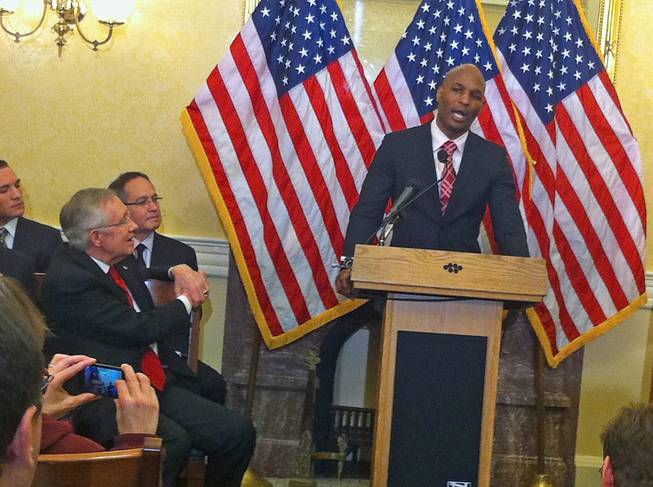
Senate Majority Leader Harry Reid looks on as IFC light heavyweight champion Bernard Hopkins speaks about the Professional Fighters Study in the Capitol, Tuesday, Feb. 4, 2014.
Wednesday, Feb. 5, 2014 | 2 a.m.
Sun coverage
The fighting world’s glitterati — most of them Nevada natives — descended on Washington, D.C., on Tuesday to show unified support for the Cleveland Clinic’s ongoing study of head and brain injuries among fighters.
Representatives from Golden Boy Promotions, Top Rank Boxing, the Ultimate Fighting Championship, Spike TV’s Bellator MMA and Glory kickboxing joined hospital officials and Sens. Harry Reid, D-Nev., and John McCain, R-Ariz. — both serious boxing enthusiasts — to trumpet the study, now about two and a half years in.
“If we don’t do this, then I’m afraid that support for these incredible, entertaining sports will wane on the part of the American people,” McCain said.
The Professional Fighters Study at the Cleveland Clinic’s Lou Ruvo Center for Brain Health is one of many ongoing efforts to examine the role of head trauma in precipitating degenerative brain disorders, such as Parkinson’s and Alzheimer’s diseases.
About 400 active boxers and mixed martial arts fighters are participating; study directors hope to increase that number to 650. It is the only such brain trauma study examining active athletes.
“Most head injuries do not produce a brain injury. But some head injuries start a process that ends up in something that looks like Alzheimer’s disease,” said Jeffrey Cummings, director of the Ruvo Center. “From this we’ll learn about other sports, we’ll learn about military injuries, we’ll learn about other civilian injuries. The information is immensely valuable.”
It’s the type of study that one might think boxing and MMA representatives would descend on Washington to promote if there were critical legislation at stake. But the group was backing no particular bill.
Neither was the group lobbying for a specific pot of funding — though the study does have one grant, from the Defense Department.
Instead, the group seemed focused on setting an example for how the country, and the Capitol, could approach having a more a coordinated look at the high-profile issue of head trauma and brain injury.
“With government grants being hard to come by, we’re just so thrilled that these organizations really stepped up to make sure that we finish our business and sustain the study long enough so we can get the answers that we need,” said principal study investigator Charles Bernick.
Fighters and their competing promoters have joined forces to provide financial backing and the athletes to participate in the study.
“When I was approached by Larry Ruvo and members of the Cleveland Clinic, it was an easy decision to say that we were all in,” said Lorenzo Fertitta, CEO of Ultimate Fighting Championship. “It’s very important to learn as much as we possibly can about the effects for these athletes, both now and for the future.”
“If organizations that are as fiercely competitive as Viacom, Ultimate Fighting Championship and Golden Boy can come here and talk today, I think there’s still hope for North and South Korea,” Kevin Kay, president of Spike TV joked. “Maybe even Democrats and Republicans.”
There was a palpable urgency in the room as well, as lawmakers and promoters recalled anecdotes of particularly troubling cases of head trauma, such as Muhammad Ali's.
“I think all of us would agree that his present condition is particularly attributable to the sustained blows to the head that this great, wonderful athlete sustained,” McCain said.
Or Sugar Ray Leonard: “This handsome man that was one of the greatest fighters of all time … 150, 200 fights that he had, and really it had its toll,” Reid said.
Reid, a boxer in his youth, said it was “really a thrill” to be among the fighters — and stared grinning at the fighters, all but starstruck as they spoke.
“Bernard, I watched your fight with Oscar de la Hoya,” Reid said to IBF light heavyweight champion Bernard Hopkins. “I have never seen anything like what you did to him. It was one punch and he went right down. … That was the most powerful punch I have ever seen.”
Bridging the chasm between the thrill of a punch and the danger of it is precisely the group’s aim.
“Yes, we chose and signed up for this, but it’s also for y’all’s entertainment,” Hopkins said. “We just need the good doctors, the good people and the support … so I’m glad that everyone here is motivated like an athlete.”
What all that could or might lead to in Washington was not clear, however. McCain said he thought Congress could do more to regulate boxing but declined to iterate a wish list.
For now, they're just trying to finish the study.

Join the Discussion:
Check this out for a full explanation of our conversion to the LiveFyre commenting system and instructions on how to sign up for an account.
Full comments policy